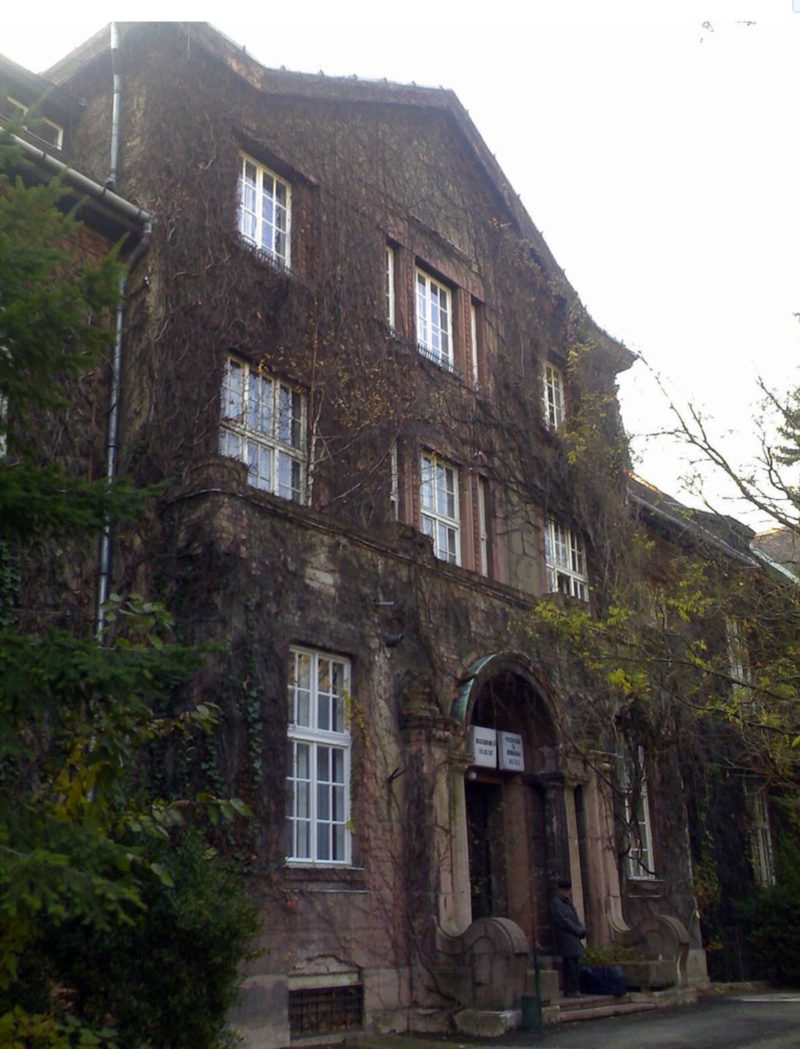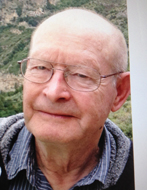
St. Janos Hospital, Budapest Daily Photo
Szent János Kórház
by Paul Sohar
This July our yearly vacation in the family summer home on Late Balaton in Hungary started beautifully; the lake was smooth, the sun was pleasantly warm and so was the family atmosphere. I usually tried to do some work in the morning, mostly translation of modern Hungarian poetry, until around 11 a.m., when I started to get tired and we went for our first swim of the day. The last time though this routine took a different course; I was eager to finish something even as I was fighting off drowsiness, and it was a half an hour later that my daughter and I walked out to the beach. That’s the last thing I remember until I woke up tied into a bed in a room of similarly accommodated other zombies—no disrespect intended, only a state of mind described. As I slowly regained consciousness I was made to understand that I had suffered a stroke (luckily this happened before I stepped into the lake where an elderly neighbor, an avid fisherman, had lost his life earlier this summer, perhaps pursuing a carp); a speedy ambulance took me to the nearest city hospital where I was immediately treated for thrombolysis, and by next day I was pronounced out of danger though I was still essentially unconscious. But by the evening a call came from the hospital: bad news, heart attack. I was moved to a hospital in Budapest, Szent János Kórház, a scattering of late 19th century structures in a park-like setting but without air-conditioning in a record-setting heat wave. And I was a zombie not only in the sense of being unconscious but also aggressive; one nurse claimed I’d bit her hand as she was tying my hands to the sidebars of the bed. But due to expert care and good luck I soon regained consciousness and coordination without any one of the usual residual symptoms of heart attacks; instead of months of rehab I was kept for only a few more days and discharged with the admonition not to ask why I got well, just enjoy life. That and seven prescriptions. And come back in six months for further treatment.
Thus I am very grateful for the care I received in both hospitals. My depressive descriptions and the casual treatment of fatality are due to the nature of the illness treated there and the casual way the Grim Reaper comes for us eventually. Also, a neurological condition gave an added twist to my condition.
In addition, perhaps I owe an explanation of the healthcare situation in Hungary; it is complicated by the loss of educated healthcare professionals to the richer countries in the EU and Switzerland. The higher pay abroad proved irresistible to many nurses and doctors, and now many hospitals are struggling with staffing problems. Nurses are working in two shifts, and the doctors spend all day in the hospital or the associated university, working and teaching. According to EU regulations all EU citizens are free to choose which country of the EU they want live and work in. By the way, this was one of the motives behind Brexit; England is overwhelmed by Eastern Europeans who are willing to work for lower wages and/or collect on the generous welfare benefits.
The Rally of Beds
Maybe I’m lagging behind because I keep forgetting to count the beds,
I’m too eager to hold on to my icepack and flying a kite with my IV
instead of turning on my engine like the others; they’re off in a roar,
and I’m still trying to read the wind zigzagging among us, sometimes
crashing into the door. At the beginning I, too, roared: Let me get out,
my bare feet are my wings and my eyes, they lead me to quiet pastures,
I promise… But what god was I talking to? To what pair of glasses?
Who can talk to a syringe disguised as a lightning bolt? Some of the riders
clap themselves, some cry, but I don’t know what effect I’m after; a breath
of solid shout of defeat or victory, a prayer to strangle me and hang me by
the IV pole. And all that while the beds are off and running, some with
hiccupping engines, some without them, and the nurses reminding us that
Prof Dr F. doesn’t like to see rolls of toilet paper roosting on night tables,
pigeons crapping on the good doctor’s work.
EEG Epitaph
“Why do we have to bother with this…”
The husky male nurse barks at his spry redhead partner and
at the body lying between them, looking like a skeleton filled in
with desert sand, now lying still, the machinery in disarray,
the blinking lights out, the pumps at rest.
“Why do we have to bother with this….”
The nursing pair snap on eeg attachments in a perfunctory manner
like setting up chess figures on the silent body’s chest,
the black box nearby churns out a strip of chart paper about a page long,
the redhead nurse rips it off, and then they cart off the black box
with the cabled chess pieces and the rest.
Why do we have to bother with this?
I hear the question again—coming from where? The empty shell?
Or from this shell here, feeling its contents rapidly draining away, or
perhaps ebbing into and an ocean of peacefully, powerfully rocking waves.
They don’t ask why we have to bother with this. Certainly not
the hospital bed now covered with a crumpled white sheet, and there’s
no way of saying if there’s anyone under it.
The chart paper, already a part of a file in the office,
is the epitaph that answers all questions.
And it excuses from further questions the silent heart that originated it.
Final Inventory
Bed No.5 has been cleared of all tubes and auxiliary equipment
except for a crumpled white sheet on it which may or may not
have anything to hide, but already a team of two nurses rush in,
the senior nurse brandishing a garbage bag and the junior nurse
a sheet of paper, an unfilled form. The senior nurse goes to the night table
and starts filling the bag from there, calling out each item loudly enough
for the whole floor to hear, and the junior nurse repeats each item with
equal force as she records it in the official form:
One pair of pajamas, top and bottom!
Four t-shirts!
A pair of glasses, probably for reading!
Dentures in a plastic bag!
One pair of trousers with suspenders!
One pair of slippers!
“Wait a minute, are you sure it’s not hospital property?”
“They’re old fashioned, made of felt top, we don’t have anything like that. Next:”
A jar of prunes!
A spoon, aluminum, not hospital property!
A box of cookies, open but still full!
One comb!
One robe, woolen, not ours!
And that’s it.
“In that case come and sign the personal property list.”
“That’s all right, you can sign it, nobody will read it if they come to claim the body.”
“The family been notified?”
“How should I know? It’s not my job. Let’s move on!”
The senior nurse leads the march out of the room, clutching the garbage bag to her
respectable spare tire, leaving the night table open and empty.
In the other beds the groans and snores continue as usual, only No. 5 is silent.
Now there’s just the Personal Property List to speak for the occupant of Bed No.5.
The Story of Bed No.2
Detached from IV and catheter, dressed like a visitor, I’m standing at the foot
of Bed No.2, looking at the well-worn but empty white sheet and the sweaty cover
now bunched up into a sleepless heap, still waiting for disposal, but the body is gone,
I reclaimed it from the ghosts of the underworld who were keeping me trapped
in that bed.
Is this for real? Am I really free? Or will this bed follow me capture me again
at an unprepared moment?
“An unprepared moment?” The bed laughs at me. “You’re hopping from one
unprepared moment to the next, like from one rock to the next in a flooding
river. You never know when you’re going to slip. And when you cross
the river, you know what?”
“No more moments, prepared of not; the end is there waiting somewhere…”
“That’s right, I don’t have to follow you around to catch you, you’ll beg me to
hug you again like an old lover….”
I try to break off this dispute with my bed by saying goodbye to Bed No.7, a calm face,
silvery hair nicely combed.
“Yes, I’m leaving this afternoon,” he says.
“How long have you been here?”
“I came this morning, but clearly, this is not the place for me….”
A few days before I, too, argued with the staff that I was in the wrong
boat and I had to hurry and catch the right one… please help me…
please untie me…. etc, etc.
Nothing else for me to do but give a limp hand wave to Bed No.7, a wave
that’s the secret code of the not so secret society I now belong to, nilly-willy,
and I decide to wait for the doctor’s final report and discharge instructions out in
the corridor. At a safe distance from Bed No.2.
About the author:
 Paul Sohar earned a BA in philosophy and worked a day job in chemistry while writing in every genre, publishing fifteen volumes of translations from Hungarian, most significantly poetry by George Faludy (
Paul Sohar earned a BA in philosophy and worked a day job in chemistry while writing in every genre, publishing fifteen volumes of translations from Hungarian, most significantly poetry by George Faludy (Silver Pirouettes
; Ragged Sky Press) and Sándor Kányádi (In Contemporary Tense
; Iniquity Press). His own poetry collections include Homing Poems
(Iniquity) and The Wayward Orchard
, a 2011 Wordrunner Press Prize winner. Prose works include True Tales of a Fictitious Spy
(Synergebooks) and a collection of three one-act plays from One Act Depot. Magazine publications include Agni, Gargoyle, Rattle
, Ragazine
and Rhino
, among others.
 Paul Sohar earned a BA in philosophy and worked a day job in chemistry while writing in every genre, publishing fifteen volumes of translations from Hungarian, most significantly poetry by George Faludy (Silver Pirouettes; Ragged Sky Press) and Sándor Kányádi (In Contemporary Tense; Iniquity Press). His own poetry collections include Homing Poems (Iniquity) and The Wayward Orchard, a 2011 Wordrunner Press Prize winner. Prose works include True Tales of a Fictitious Spy (Synergebooks) and a collection of three one-act plays from One Act Depot. Magazine publications include Agni, Gargoyle, Rattle, Ragazine and Rhino, among others.
Paul Sohar earned a BA in philosophy and worked a day job in chemistry while writing in every genre, publishing fifteen volumes of translations from Hungarian, most significantly poetry by George Faludy (Silver Pirouettes; Ragged Sky Press) and Sándor Kányádi (In Contemporary Tense; Iniquity Press). His own poetry collections include Homing Poems (Iniquity) and The Wayward Orchard, a 2011 Wordrunner Press Prize winner. Prose works include True Tales of a Fictitious Spy (Synergebooks) and a collection of three one-act plays from One Act Depot. Magazine publications include Agni, Gargoyle, Rattle, Ragazine and Rhino, among others. 
Recent Comments